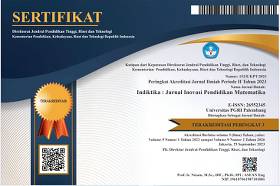UPAYA MENINGKATKAN HASIL BELAJAR MATEMATIKA SISWA SMA MELALUI METODE KOOPERATIF TIPE THINK PAIR SHARE
DOI:
https://doi.org/10.31851/indiktika.v1i2.3103Abstract
Tujuan penelitian ini untuk mengetahui apakah pembelajaran dengan menggunakan metode kooperatif tipe think pair share dapat meningkatkan hasil belajar siswa pada materi sistem pertidaksamaan linear dua variabel. Jenis penelitian adalah penelitian tindakan kelas. Subjek penelitian ini adalah siswa kelas XII. IPS. 1 SMA Negeri 10 Batanghari pada semester ganjil tahun pelajaran 2018/2019 yang berjumlah 23 orang. Penelitian dilaksanakan dari tanggal 23 Agustus 2018 sampai dengan 23 Oktober 2018. Tempat pelaksanaan di kelas XII.IPS.1 SMA Negeri 10 Batanghari. Penelitian dilakukan dalam dua siklus yang terdiri dari 4 tahap yaitu, perencanaan, pelaksanaan tindakan, obsevasi dan refleksi. Persentase nilai siswa, yang memenuhi KKM pada siklus I sebanyak 65,22% dan siklus II sebanyak 78,26%. Dapat disimpulkan bahwa pembelajaran dengan metode kooperatif tipe think pair share ini dapat meningkatkan hasil belajar siswa pada materi sistem pertidaksamaan linear dua variabel.
 Kata kunci : hasil belajar matematika, think pair share
The purpose of this study is to find out whether learning using the cooperative method type think pair share can improve student learning outcomes in the material of the two variable linear inequality system. This type of research is classroom action research. The subject of this research is class XII students. IPS. 1 SMA Negeri 10 Batanghari in the odd semester of the 2018/2019 academic year totaling 23 people. The study was conducted from August 23, 2018 to October 23, 2018. The place of implementation in class XII.IPS.1 SMA 10 Batanghari. The research was conducted in two cycles consisting of 4 stages, namely, planning, implementing actions, observing and reflecting. Percentage of student scores, which meet the KKM in the first cycle as many as 65.22% and the second cycle as many as 78.26%. It can be concluded that learning using the cooperative method of the think pair share type can improve student learning outcomes in the system material in a two-variable linear equation.
Â
Keywords : mathematics learning outcomes, think pair share
References
Ali, M. 2013. Penelitian Kependidikan Prosedur dan Strategi. Bandung: CV. Angkasa.
Hamalik, Oemar. 2005. Proses Belajar Mengajar. Jakarta: Bumi Aksara.
Kemmis, S. and Mc. Taggart, R. 1988. The Action Research Planner. Victoria Dearcin University Press.
Nurhayati, A., Usodo, B., dan Kuswardi, Y. 2018. Eksperimentasi Model Pembelajaran Kooperatif Tipe Think Pair Share (TPS) dengan Pendekatan Quantum Learning Ditinjau dari Gaya Belajar Matematika Siswa Kelas VIII Semester Gasal SMP Negeri 16 Surakarta Tahun Pelajaran 2013/ 2014. Jurnal Pendidikan Matematika dan Matematika SOLUSI, Vol. 2(3) : 221-230.
Ramdhani, N.F. dan Murdiana, I Nyoman. 2015. Penerapan Model Pembelajaran Kooperatif Tipe Think Pair Share Untuk Meningkatkan Hasil Belajar Siswa Kelas VIII SMP Negeri 3 Banawa Pada Materi Persamaan Garis Lurus. Jurnal Elektronik Pendidikan Matematika Tadulako, Vol. 2(3) : 294-304.
Slameto. 2010. Belajar dan Faktor-faktor yang Mempengaruhinya. Jakarta : Rineka Cipta.
Sudjana, Ibrahim. 2009. Penelitian dan Penilaian Pendidikan. Bandung: Sinar Baru Algesindo.
Suharsimi, A., Suhardjono, dan Supardi. 2007. Penelitian Tindakan Kelas. Jakarta: Bumi Aksara.
Trianto. 2011. Model Pembelajaran Terpadu. Jakarta: Bumi Aksara.
Wiriaatmadja, Rochiati. 2008. Metode Penelitian Tindakan Kelas. Bandung: Kerjasama Universitas Pendidikan Indonesia dan PT. Remaja Rosdakarya.
Downloads
Published
Issue
Section
License
This work is licensed under a Creative Commons Attribution-ShareAlike 4.0 International License.
Authors who publish with this journal agree to the following terms:
- Authors retain copyright and grant the journal right of first publication with the work simultaneously licensed under a Creative Commons Attribution License that allows others to share the work with an acknowledgement of the work's authorship and initial publication in this journal.
- Authors are able to enter into separate, additional contractual arrangements for the non-exclusive distribution of the journal's published version of the work (e.g., post it to an institutional repository or publish it in a book), with an acknowledgement of its initial publication in this journal.
- Authors are permitted and encouraged to post their work online (e.g., in institutional repositories or on their website) prior to and during the submission process, as it can lead to productive exchanges, as well as earlier and greater citation of published work.













